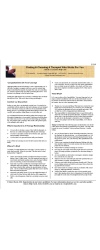Overview of Assertive Communication
The Core Principles of Assertive Communication
Assertiveness, or assertive communication has become a commonly trained method to help people communicate so that, at least theoretically, both parties can talk about, and have their needs met in a cooperative, and bridge building way. It’s likely you have heard the term, and believe that assertiveness means “standing up for oneself”, and in a sense that’s true, but that’s only a small part of it.
The Core Principles
- Each person has the right to pursue the fulfilment of his or her needs, but only in a way that is non-aggressive, and involves communicating in a way that is NOT intended to hurt another.
- Assertiveness is about finding the “sweet spot” between being passive (taking it in silence or communicating concerns in a “wimpy” way, and being too aggressive. It’s a lot harder than one would thing to find that sweet spot, because it might “move” depending on the person you communicate with or what you communicate.
- Assertive communication NEVER involves insults, abusive remarks, but focuses on behavior when possible, and communicating how that behavior affects YOU, both practically and emotionally.
- The typical assertive format includes:
- Identifying and communicating the behavior of the other person
- explaining how it affects you
- requesting a change in that behavior
Examples Of Assertive Vs Non-Assertive
Not Effective
You always take advantage of me… (too general, not going to work, uses “always”)
Don’t mind me. I’m used to people taking advantage of me (passive aggressive)
Don’t F***** talk to me that way. (abusive, likely to start an argument)
Assertive Effective Versions
When you ask me to go for cigarettes when you can go yourself, sometimes I feel pressured because I want to be helpful to you, but I sometimes feel like you are taking advantage, so I’m wondering if you could make sure you have enough on hand.
Last night, when you wanted me to do all the cooking and clean up, it was difficult because I also needed to make those phone calls, and felt really pressured. I’d love it if, in those situations, you might help me out a bit and do the clean up, perhaps next time>






